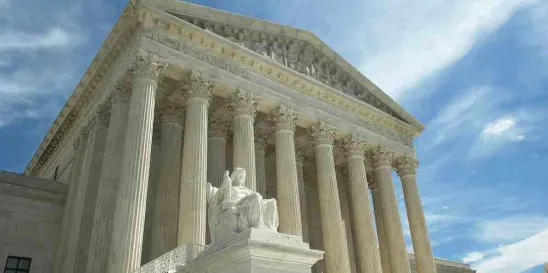In the New Year, the United States Supreme Court is expected to hear arguments over the damages a plaintiff can recover in a copyright infringement lawsuit.
The Supreme Court will consider the question of whether damages are limited only to the three-year period before the plaintiffs filed suit, or whether they can be retrospectively awarded for a longer period, as long as the plaintiffs filed within three years of discovering the infringement.
In Warner Chappell Music Inc. v. Nealy, the plaintiffs filed a lawsuit alleging various music compositions that they own and recorded over 35 years ago were incorporated into a 2008 Flo Rida song “In the Ayer” without their permission.[i] While the reasons for the delay are long, and involve multiple periods of incarceration and subsequent licenses and transfers among other entities, suffice it to say that plaintiffs claim they learned of the alleged infringement in January 2016 and filed this lawsuit in December 2018—more than ten years after the alleged infringement began and almost three years after learning about it.[ii]
The Southern District of Florida relied on the Supreme Court precedence from a previous case to conclude that “[a]lthough an action…accrues when a plaintiff knew or should have known that their rights were being infringed, their damages are limited to the three-year period before they filed suit even if the infringement went further back than the three-year period.”[iii] The Eleventh Circuit reversed on an interlocutory appeal, applying the discovery rule and therefore holding that a “a copyright plaintiff may recover retrospective relief for infringement occurring more than three years before the lawsuit’s filing so long as the plaintiff’s claim is timely under the discovery rule.”[iv]
The Supreme Court has granted certiorari on this question presented: “Whether, under the discovery accrual rule applied by the circuit courts and the Copyright Act’s statute of limitations for civil actions, 17 U. S. C. §507(b), a copyright plaintiff can recover damages for acts that allegedly occurred more than three years before the filing of a lawsuit.”
The briefing is scheduled to be completed in January 2024, with an anticipated oral argument scheduled during February 2024.
The Background
Pursuant to the statute of limitations set forth by the Copyright Act, a plaintiff in a copyright infringement action must bring suit within three years after the claim “accrues.”[v] Claims normally “accrue” when the alleged infringement occurs. Therefore, if infringement occurs within three years of a plaintiff bringing the suit, the plaintiff can claim three years of damages. For example, in Petrella v. Metro-Goldwyn-Mayer, Inc.,[vi] the plaintiff brought a copyright infringement lawsuit involving the Martin Scorsese movie “Raging Bull” based on the life of boxing champion Jake LaMotta. While the alleged infringement was based upon the releases and re-releases of the film in different mediums like VHS, DVD, Blu-ray, etc. over a lot of years, the plaintiff sought damages for only the three years prior to filing the lawsuit. MGM moved for summary judgment invoking the doctrine of laches, which is an equitable theory that the plaintiff cannot unreasonably delay bringing a lawsuit. However, the U.S. Supreme Court found that when an infringing act occurs within the three-year limitations’ period, laches cannot bar the pursuit of damages for those three years only.
In Petrella, the discovery rule—a doctrine that says a claim “accrues” when the plaintiff discovers, or with due diligence should have discovered, the basis for the claim—did not apply because alleged acts of infringement did occur during the three years prior to the lawsuit being filed. Petrella therefore left open the question as to what happens when no infringement occurs in the immediately preceding three years of the lawsuit, but the plaintiff sued when it discovered the earlier infringement. Right now, a circuit split exists between the Second Circuit on the one hand and the Ninth and Eleventh Circuits on the other. This question will be decided in 2024 when the Supreme Court decides Warner Chappell Music Inc. v. Nealy.[vii]
Why This Case Matters
The two biggest centers of copyright litigation—the Ninth and Second Circuits—have been split on this issue. In the 2020 Sohm v. Scholastic Inc. decision, the Second Circuit felt bound by Petrella and held that a three-year limitation of damages applies regardless of whether the discovery rule applies, despite recognizing that such a holding undermined the purpose of the discovery rule as the plaintiff could have a timely claim but no available relief.[viii] The Ninth Circuit, on the other hand, reached the opposite conclusion in 2023 in Starz Entertainment, LLC v. MGM Domestic Television Distribution, LLC, finding instead that the Copyright Act “three years after the claim accrued” language says nothing about remedies, and limiting damages to three years when the discovery rule applied would “eviscerate the discovery rule.”[ix] Of course, with Warner Chappell, now the Eleventh Circuit is aligned with the Ninth Circuit.
While the Sixth Circuit has not weighed in on this issue, several courts within the Sixth Circuit have and themselves are at odds here. On the one hand, the Southern District of Ohio in Navarro v. Procter & Gamble, Company ultimately sided with the Second Circuit but only after grappling with the exact tension now being decided by the Supreme Court: the tension between the statute of limitations and discovery rule precedence on the one hand and the Petrella precedence on the other.[x] Courts in the Northern District of Ohio and Western District of Kentucky, have declined to read Petrella as barring recovery for damages that occurred more than three years before suit.[xi]
As this upcoming Supreme Court decision will affect copyright infringement cases moving forward, Dinsmore attorneys will be following this issue closely and advising our clients on any new developments.
[i] No. 1:18-cv-25474, 2021 U.S. Dist. LEXIS 43980, at *4 (S.D. Fl. Mar. 8, 2021).
[ii] Id., **26-34.
[iii] Id., n.6.
[iv] 60 F.4th 1325, 1331 (11th Cir. 2023).
[v] 17 U.S.C. § 507(b).
[vi] 572 U.S. 663 (2014).
[vii] 60 F.4th 1325 (11th Cir. 2023), cert. granted, 92 U.S.L.W. 3063 (U.S. Sept. 29, 2023) (No. 22-1078). The case is likely to be scheduled for oral argument in February 2024.
[viii] Sohm v. Scholastic Inc., 959 F.3d 39, 52 (2d Cir. 2020) (barring recovery for all acts of infringement occurring before the three-year look-back period).
[ix] Starz Ent’tnment, LLC v. MGM Domestic Tele. Distrib., LLC., 39 F.4th 1236, 1242-44 (9th Cir. 2022) (finding that “[t]here is no reason for a discovery rule if damages for infringing acts of which the copyright owner reasonably becomes aware years later are unavailable”).
[x] 515 F. Supp. 3d 718, 759 (S.D. Ohio Jan. 19, 2021), recons. denied, No. 17-cv-406, 2021 U.S. Dist. LEXIS 44618, at *1-2 (S.D Ohio Mar. 10, 2021).
[xi] See Design Basics, LLC v. Forrester Wehrle Homes, Inc., 305 F. Supp. 3d 788, 792-93 (N.D. Ohio 2018) (“reject[ing] the argument that Petrella overruled the Sixth Circuit’s rule that copyright-infringement claims accrue under the discovery rule”); Mitchell v. Capitol Records, LLC, 287 F. Supp. 3d 673, 677 (W.D. Ky. 2017) (“Petrella does not require the Court to ignore Sixth Circuit precedent that clearly defines accrual of a copyright claim as occurring when the plaintiff knew of the potential violation or is chargeable with such knowledge.”) (internal citations omitted).



 />i
/>i

